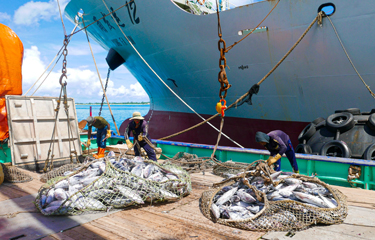China’s government has given its fleet until 24 April to comment on a draft new regulatory system for the process of at-sea transshipment, vowing to “create a transparent system from sea to port” for the country’s distant-water fishery sector.
On 14 April, China’s Ministry of Agriculture, which oversees the sector, sent a letter to all fishing companies with licenses to operate internationally proposing the plan, under which vessel owners will be required to compile records of all transshipments of their catches. The ministry said its move is to ensure that Chinese vessels are compliant with rules set by the world’s regional fishery management organizations (RFMOs).
However, under the proposal, much of the reportage – as well as a new system of observers to be stationed on board vessels – will be handled by the China Distant Water Fishing Industry Association, also known as the China Ocean Fisheries Association, a government-funded entity that serves as the industry’s representative body.
The association, according to the ministry’s letter, “shall establish a special mechanism to strengthen the coordination and self-discipline management and services of transport ships” and will “coordinate” the new system, collecting records from operators while also dispatching observers to vessels.
The observers will be selected by the ministry and data will also be analyzed by staff of three little-known entities under the agriculture ministry: the Ocean Fisheries Training Center, China Ocean Fisheries Data Center, and the Ocean Fisheries International Compliance Research Center.
Another goal of the new regulations is the establishment of a new China Ocean Fishery Transportation Trading Platform for companies engaged in distant-water fishing and transshipment, in order to “promote market-oriented, transparent and standardized” distant-water fishery transportation while improving the Chinese industry’s international competitiveness. Yet the ministry will again rely on the association to set up the platform.
Transshipment is often blamed for enabling illegal, unreported, and unregulated (IUU) fishing as it allows illicit operators to relabel catches.
The United Nations’ Food and Agriculture Organization (FAO) has consistently called on flag states to improve monitoring and control of transshipping, or to prohibit it. Some RFMOs restrict transshipment to ports or demand on-board observers, but non-governmental organizations tracking the sector have been critical of the ability or willingness of RFMOs are to enforce their own rules.
Photo courtesy of Francisco Blaha







